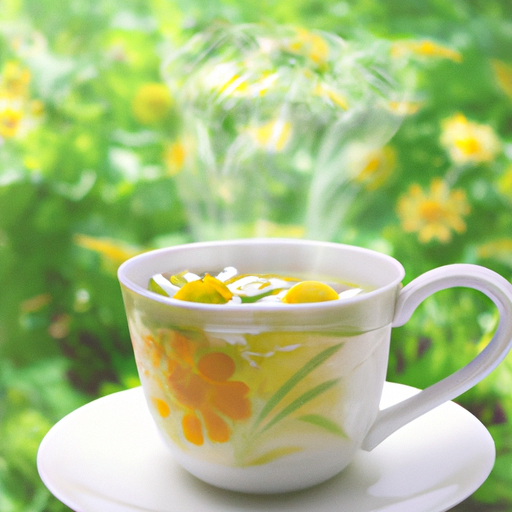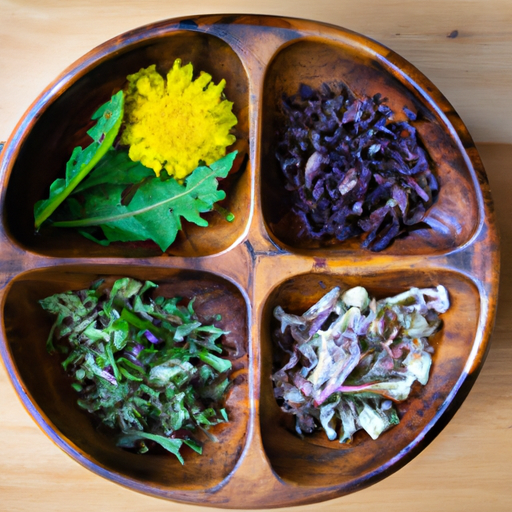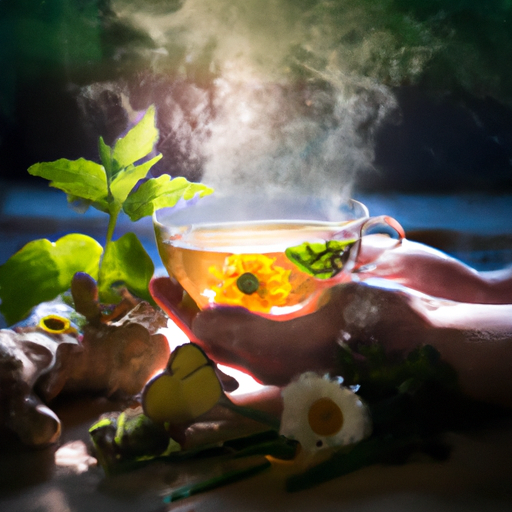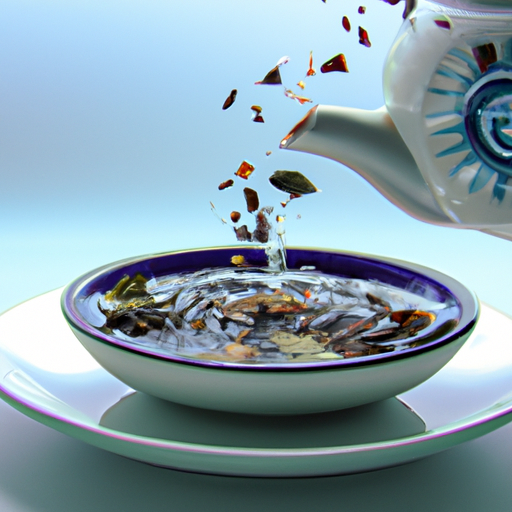As I sit here, sipping on a warm cup of herbal tea, I can’t help but appreciate the soothing effect it has on my mind and body. It’s like a gentle embrace, calming my nerves and providing a moment of tranquility in this hectic world.
But what if you’re looking for an herbal tea that doesn’t contain caffeine? Well, fear not, my fellow tea lovers, for I have delved into the world of herbal teas to bring you a comprehensive guide on which ones are caffeine-free.
Imagine a world where you can enjoy a cup of tea any time of the day or night, without the worry of caffeine jitters or sleepless nights. This world exists, and it’s filled with delightful options such as chamomile, peppermint, rooibos, hibiscus, lemon balm, ginger, and lavender teas. These herbal infusions not only offer a myriad of health benefits but also provide a caffeine-free alternative to traditional teas.
So, whether you’re seeking a moment of relaxation before bed or a midday pick-me-up without the caffeine kick, join me on this journey as we explore the wonderful world of herbal teas that will leave you feeling refreshed, rejuvenated, and caffeine-free.
Key Takeaways
- Chamomile tea does not contain caffeine and has calming properties that can help with sleep quality and digestive issues.
- Peppermint tea is caffeine-free and can aid digestion, relieve headaches, and reduce stress and anxiety.
- Rooibos tea is caffeine-free and rich in antioxidants, with anti-inflammatory properties that promote relaxation and better sleep.
- Lemon balm tea is caffeine-free and can improve mood, reduce anxiety, and has various medicinal uses.
Chamomile Tea
Chamomile tea is one of the most soothing and caffeine-free options for those looking to unwind and relax. It’s known for its calming properties and has been used for centuries to promote relaxation and improve sleep quality. This herbal tea is made from the dried flowers of the chamomile plant and has a pleasant, floral aroma.
One of the main benefits of chamomile tea is its ability to calm the mind and body. It contains compounds that have a mild sedative effect, helping to reduce anxiety and promote a sense of calm. Additionally, chamomile tea is often used as a natural remedy for insomnia, as it can help improve sleep quality and reduce the time it takes to fall asleep.
Chamomile tea can also offer other health benefits. It’s known to have anti-inflammatory properties, which can help reduce inflammation in the body and relieve symptoms of conditions like arthritis. It may also help with digestive issues, such as indigestion and stomach cramps.
There are many ways to enjoy chamomile tea. It can be brewed on its own or mixed with other herbs for added flavor. Some popular chamomile tea recipes include adding a squeeze of lemon or honey for a touch of sweetness.
Moving on to peppermint tea, this refreshing herbal tea is another great caffeine-free option for tea lovers.
Peppermint Tea
Minty Peppermint tea will give you a delightful caffeine-free experience. Peppermint tea isn’t just refreshing but also offers a wide range of health benefits. It’s known to aid digestion, relieve headaches, and reduce stress and anxiety.
The menthol in peppermint leaves has a soothing effect on the muscles of the gastrointestinal tract, promoting proper digestion and relieving symptoms such as bloating and indigestion. Additionally, the natural aroma of peppermint tea can help alleviate headaches and migraines.
To make the perfect cup of peppermint tea, start by boiling water. While the water’s heating, add a handful of fresh or dried peppermint leaves to a teapot or infuser. Once the water reaches a rolling boil, pour it over the leaves and let it steep for about 5-10 minutes. This will ensure that the tea is infused with the full flavor and therapeutic properties of the peppermint leaves. You can add honey or lemon for extra flavor, but it’s delicious on its own.
Transitioning to the next section about ‘rooibos tea,’ this herbal tea is caffeine-free and packed with antioxidants.
Rooibos Tea
To truly savor the rich flavor and explore the potential health benefits of rooibos tea, you’ll want to indulge in its caffeine-free goodness. Rooibos tea, also known as red bush tea, is a delicious and refreshing herbal tea that offers numerous benefits.
-
Rich in antioxidants: Rooibos tea is packed with antioxidants that help fight free radicals in the body. These antioxidants can help boost the immune system and protect against various diseases.
-
Anti-inflammatory properties: The tea contains anti-inflammatory compounds that may help reduce inflammation and alleviate symptoms of conditions such as arthritis.
-
Calming effects: Rooibos tea is known for its calming properties. It can help reduce stress and anxiety, promoting relaxation and better sleep.
-
Digestive aid: Drinking rooibos tea can help soothe the digestive system and relieve symptoms of indigestion, such as bloating and stomach cramps.
To make a delicious cup of rooibos tea, simply bring water to a boil and steep the tea bag or loose leaves for about 5-7 minutes. You can enjoy it hot or cold and add honey or lemon for extra flavor.
Moving on to hibiscus tea, this vibrant herbal tea offers its own unique set of benefits.
Hibiscus Tea
Indulge in the vibrant and refreshing taste of hibiscus tea, and experience its unique set of benefits. Hibiscus tea is a caffeine-free herbal tea that’s made from the dried petals of the hibiscus flower. Not only does it offer a delicious and tart flavor, but it also provides several health benefits.
One of the key advantages of hibiscus tea is its ability to support heart health. It’s been found to help lower blood pressure and cholesterol levels, which can reduce the risk of heart disease. Additionally, hibiscus tea is packed with antioxidants that help protect the body against damage from free radicals.
To brew hibiscus tea, start by bringing water to a boil and adding dried hibiscus petals. Let it steep for around 5-10 minutes, depending on your desired strength. You can also add sweeteners like honey or agave syrup to enhance the flavor. Once it’s steeped, strain the tea into a cup and enjoy it hot or cold.
Transitioning into the subsequent section about lemon balm tea, this aromatic herbal tea offers its own unique benefits and flavors.
Lemon Balm Tea
Experience the soothing and refreshing qualities of lemon balm tea, which can help improve your mood and reduce anxiety by increasing GABA levels in your brain. Lemon balm, also known as Melissa Officinalis, is a fragrant herb that belongs to the mint family. It has been used for centuries as a natural remedy for various ailments, including insomnia, digestive issues, and stress.
To give you a better understanding of the benefits of lemon balm tea, let’s take a look at the following table:
| Lemon Balm Benefits | Lemon Balm Recipes |
|---|---|
| Reduces anxiety and promotes calm | Lemon Balm Iced Tea |
| Improves sleep quality | Lemon Balm Infused Water |
| Enhances cognitive function | Lemon Balm and Honey Tea |
| Soothes digestive discomfort | Lemon Balm and Chamomile Tea |
| Supports healthy skin | Lemon Balm Facial Toner |
As you can see, lemon balm tea offers a wide range of benefits and can be enjoyed in various delicious recipes. Whether you prefer a refreshing iced tea or a calming hot beverage, there’s a lemon balm recipe to suit your taste.
Now, let’s move on to the next section about ginger tea, a popular herbal tea known for its spicy and invigorating flavor.
Ginger Tea
Get ready to invigorate your senses with a steaming mug of ginger tea, a fiery and flavorful brew that’ll leave you feeling refreshed and energized.
Ginger tea isn’t just a caffeine-free alternative to traditional teas, but it also boasts a wide range of health benefits. This aromatic beverage has been used for centuries to aid digestion, reduce inflammation, and soothe nausea.
To brew a delicious cup of ginger tea, start by peeling and slicing a thumb-sized piece of fresh ginger. Bring a pot of water to a boil and add the ginger slices. Let it simmer for about 10 minutes to allow the flavors to infuse into the water. For a stronger brew, you can increase the simmering time. Once ready, strain the tea into your favorite mug and add a squeeze of lemon or a drizzle of honey for added flavor.
Drinking ginger tea regularly can help improve digestion, boost the immune system, and even alleviate menstrual cramps. Its warming properties can also help relieve cold symptoms and soothe a sore throat. So why not cozy up with a cup of ginger tea and enjoy its numerous health benefits?
Speaking of soothing teas, let’s move on to the next section about lavender tea.
Lavender Tea
Take a moment to unwind and savor the calming aroma of lavender tea, a soothing blend that’ll transport you to a tranquil oasis.
Lavender tea is a popular herbal infusion that’s known for its numerous benefits in promoting relaxation and relieving stress. Here are some key benefits of lavender tea:
-
Calming effects: Lavender tea has natural calming properties that can help reduce anxiety and promote a sense of relaxation. It’s often used as a natural remedy for stress relief.
-
Sleep aid: Drinking lavender tea before bed can help improve the quality of sleep. It’s been found to have sedative effects, making it an excellent choice for those who struggle with insomnia or have trouble falling asleep.
-
Digestive aid: Lavender tea can help soothe digestive issues such as bloating, indigestion, and stomach cramps. It can also help improve appetite and promote healthy digestion.
-
Antioxidant properties: Lavender tea is rich in antioxidants, which help protect the body against free radicals and oxidative stress. This can contribute to overall health and well-being.
-
Easy to make at home: To make lavender tea at home, you can use dried lavender flowers. Simply steep one tablespoon of dried lavender flowers in a cup of hot water for about 5-10 minutes. Strain and enjoy!
Incorporating lavender tea into your daily routine can be a wonderful way to relax, unwind, and reap its many benefits. So go ahead, grab your favorite mug, and indulge in a cup of lavender tea for a moment of tranquility.
Frequently Asked Questions
Is it safe to consume herbal tea while pregnant or breastfeeding?
It is generally safe to consume herbal tea while pregnant or breastfeeding, but it’s important to consider safety concerns and recommended dosage. Always consult with your healthcare provider to ensure the best choice for you and your baby.
Can herbal tea be used to relieve anxiety and promote relaxation?
When it comes to relaxation and anxiety relief, herbal tea can be a soothing companion. Known for its stress-relieving properties, herbal tea can promote a sense of calm and tranquility, making it an effective option for managing anxiety.
Are there any potential side effects or interactions with medications when consuming herbal tea?
Potential side effects of consuming herbal tea include upset stomach, allergic reactions, and interactions with certain medications. It is important to consult with a healthcare professional to ensure herbal tea is safe for you to consume.
How does the taste of herbal tea compare to traditional caffeinated teas?
Herbal tea is a symphony of flavors, dancing on my tastebuds. Compared to traditional teas, it offers a unique and diverse range of tastes. While some may find herbal tea’s flavors milder, others appreciate its soothing and natural essence.
Can herbal tea be consumed hot or cold, and are there any specific brewing instructions to follow?
Hot vs. Cold: Which is the best way to enjoy herbal tea? Herbal tea can be enjoyed both hot and cold, depending on personal preference. To get the most flavor out of your tea, ensure proper brewing techniques and steeping times are followed.
Conclusion
After delving into the world of herbal teas that don’t contain caffeine, I’m left in awe of the vast array of options available. From the soothing Chamomile Tea to the invigorating Ginger Tea, there’s a herbal tea for every taste and preference. These caffeine-free alternatives not only provide a delightful sensory experience but also offer various health benefits.
So, if you’re looking to unwind or boost your well-being, why not sip on a cup of herbal goodness? Embrace the world of herbal teas and let their natural wonders envelop you. Cheers to a caffeine-free adventure!










